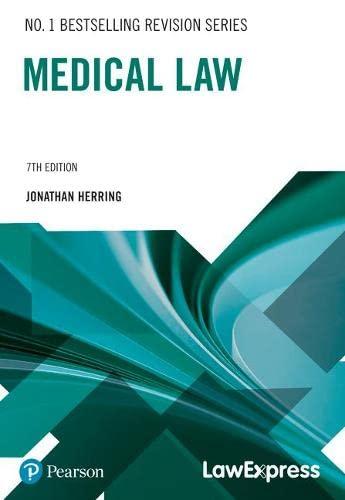Question
1. A trustee may consult the court to determine whether a particular action as trustee would be appropriate or would result in a breach of
1. A trustee may consult the court to determine whether a particular action as trustee would be appropriate or would result in a breach of the trustee's duties.
True
False
2. A trustee cannot sell trust property that the settlor specifically stated must not be sold, even with court permission.
True
False
3. A trustee may buy property directly from the trust herself without breaching any trust duty, as long as she pays a fair price.
True
False
4. A new business venture is generally viewed as a proper and safe investment for trust assets, so long as the trustee investigates the business before investing.
True
False
5. Secured government bonds are always viewed by the courts as proper investments for trust funds.
True
False
6. A trustee may obtain permission from the court to deviate from the requirements of the trust if such a deviation appears to be in the best interests of the trust and the beneficiaries.
True
False
7. A trustee may not purchase trust assets directly, but she may have an agent purchase them for her, as this avoids the appearance of improper conduct.
True
False
8. Riskier short term investments with the possibility of large cash profits are typically more beneficial to the life beneficiary, while conservative long term investments with smaller payouts are more beneficial to the remainderman.
True
False
9. Inflation is typically more of a concern for the remainderman of a trust than for the life beneficiary
True
False
10. A breach of trust will not be found where the trustee's actions don't result in monetary harm to the trust or the beneficiaries.
True
False
11. A trustee may make an unsecured personal loan with trust funds, as long as the trustee knows the recipient of the loan well, or has performed a credit check prior to lending the money.
True
False
12. A trustee may never liquidate the trust assets and terminate the trust for the benefit of needy beneficiaries, even with advance court permission.
True
False
13. A trustee who previously had business dealings with the settlor of the trust may continue to do business with the trust itself, so long as the terms are the same or similar to the terms of the business previously conducted with the settlor.
True
False
14. A trustee must keep detailed records of all trust transactions, even minor ones, and may be called before the court to account for the status of the trust.
True
False
15. A trustees powers may never be inferred, as they must arise directly from the express language of the trust instrument in order to be legally valid.
True
False
Step by Step Solution
There are 3 Steps involved in it
Step: 1

Get Instant Access to Expert-Tailored Solutions
See step-by-step solutions with expert insights and AI powered tools for academic success
Step: 2

Step: 3

Ace Your Homework with AI
Get the answers you need in no time with our AI-driven, step-by-step assistance
Get Started


